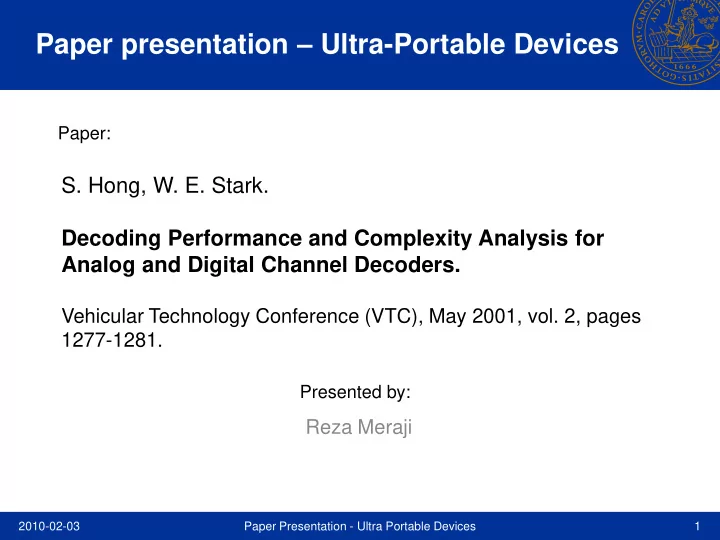

Paper presentation – Ultra-Portable Devices Paper: S. Hong, W. E. Stark. Decoding Performance and Complexity Analysis for Analog and Digital Channel Decoders. Vehicular Technology Conference (VTC), May 2001, vol. 2, pages 1277-1281. Presented by: Reza Meraji 2010-02-03 Paper Presentation - Ultra Portable Devices 1
Outline • Decoder Models – Digital Viterbi decoder – Analog Viterbi decoder • Basic read/write analog memory model • Performance Evaluations – Noise sources in decoders – Data access and path memory length • Comparisons of energy and area • Summary and conclusion 2010-02-03 Paper Presentation - Ultra Portable Devices 2
Digital and Analog Processing System Models 2010-02-03 Paper Presentation - Ultra Portable Devices 3
Decoder Architecture Models for Convolutional Codes 2010-02-03 Paper Presentation - Ultra Portable Devices 4
Main Processing Units 2010-02-03 Paper Presentation - Ultra Portable Devices 5
Analog Memory Model 2010-02-03 Paper Presentation - Ultra Portable Devices 6
Memory Read Access (Scaling) 2010-02-03 Paper Presentation - Ultra Portable Devices 7
Noise Sources in Decoders • Digital – Quantization noise – Finite wordlength • Analog – Noise due to nonlinearity of the read and write amplifiers – Noise due to charge leakage (strong function of time and temperature) – Noise due to charge sharing (capacitor mismatches) 2010-02-03 Paper Presentation - Ultra Portable Devices 8
Analog Decoder Performance: as a function of capacitor sizes 2010-02-03 Paper Presentation - Ultra Portable Devices 9
Analog Decoder Performance: as a function of overall amplifier gain deviation 2010-02-03 Paper Presentation - Ultra Portable Devices 10
Data Access and Path Memory Length • Data access – Too many memory access times: Data value deterioration – Memory not accessed quickly enough: information leaks as electric charge • Path memory length: – Small dynamic range (limited supply voltage) – Computational overflow for a long path memory length 2010-02-03 Paper Presentation - Ultra Portable Devices 11
Power Dissipation in Decoders • Digital: – Switching power dissipation – Short-circuit current power • Analog: – Mostly because of biasing current • Memory access power dissipation applies for both 2010-02-03 Paper Presentation - Ultra Portable Devices 12
Energy and Area Comparisons 2010-02-03 Paper Presentation - Ultra Portable Devices 13
Summary • Analog circuits: a solution for small size, high speed and low-power signal processing applications • System performance distortion due to imperfect characteristics of analog citcuits • Undesirable effects of the analog memory on the decoder performance 2010-02-03 Paper Presentation - Ultra Portable Devices 14
Recommend
More recommend